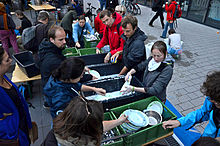VolxKuche/VolxKüche (VoKu/VoKü), also Küche für Alle (KüfA) and Bevölkerungsküche (BeVoKü), peoples kitchen, free supper club, and kitchen for all are names used for a weekly or regularly occurring group cooking event, at which the meal is served free of charge or at cost.


History
editThe name derives from the German expression "people's kitchen" (soup kitchen), as a secular counterpart of the Christian soup kitchen.[citation needed] Volxküchen are found usually in collective and/or self-managed arrangements (pubs, information stores, youth centers or autonomous centers) with politically left self-identity. In general at least one vegetarian meal is offered, frequently also vegan food. Often soon to be expired ingredients are obtained at cost, or donated by food banks, food manufacturers or community gardens.[1][2]
The Volxküche in the current sense arose in the West European squatter scene of the early 1980s.[citation needed] Squatters in the Netherlands use the name volkskeuken or VoKu, cooking vegan or vegetarian food for sale at a cheap price. This fitted beside other networked activities such as local exchange trading systems, Food not Bombs, free shops and food cooperatives.[3] Squatters in the German city of Hamburg founded a Volxküche at the Hafenstraße in 1982.[4] Students in Vienna occupied a lecture theatre in 2009 and started a Volxküche as part of a longterm plan which included making sleeping areas and rooms for events.[5]
A 'Free Supper Club" was held twice a month in San Francisco, US, as of 2013. It called itself VolxKuche San Francisco.[6]
See also
editReferences
edit- ^ Hannabambel Tavern Collective (2011). Das Volxküchen-Kochbuch. Alibri Verlag. ISBN 978-3-86569-081-4.
- ^ Hannabambel Tavern Collective (2011). Volxküche De Luxe. Alibri Verlag. ISBN 978-3-86569-082-1.
- ^ Poldervaart, Saskia (2005). "Niet-bestuurlijke vormen van politiek. Ofwel: hoe het persoonlijke politiek is geworden in de kraak-queer-en andersglobaliseringsbeweging". Tijdschrift voor Genderstudies. 3.
- ^ "Hafenstraße: "Das war wie eine Dauerdroge" [Hafenstraße: "It was like a permanent drug"]". NDR (in German). 14 October 2013. Retrieved 19 January 2022.
- ^ Foltin, Robert (2010). "Die Proteste der Studierenden in Österreich". Sozial Geschichte Online. 2: 116–123.
- ^ "About VolxKuche San Francisco - vokusf.org". www.vokusf.org. Retrieved 2 June 2022.